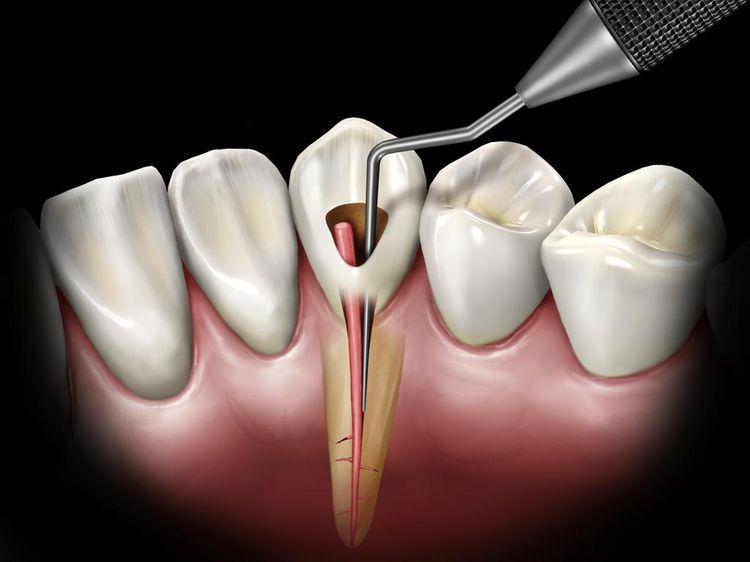Endodontics
Endodontics
What is a Root Canal Treatment?
Root canal treatment is designed to eliminate bacteria from the infected root canal, prevent reinfection of the tooth and save the natural tooth. When one
undergoes a root canal, the inflamed or infected pulp is removed and the
inside of the tooth is carefully cleaned and disinfected, then filled and sealed.
Common causes of damage to the pulp include:
- Deep decay due to an untreated cavity
- Multiple dental procedures on the same tooth
- A chip or crack in the tooth
- An injury to the tooth (you might injure a tooth if you get hit in the mouth; the pulp can still be damaged even if the injury doesn’t crack the tooth)

What is tooth pulp?
Tooth “pulp” is what dental providers call the nerves, blood vessels and other tissues deep inside each tooth. (When you look in the mirror, the part of your teeth that you see is an outer layer called enamel.)
The pulp, or connective tissue inside teeth, plays an important role in helping children’s teeth develop as they grow.
Tooth decay due to poor teeth and gum care or a cracked tooth can lead to pulpitis (an inflamed or infected tooth pulp).
Pulpitis often causes a painful toothache (tooth pain). It can sometimes lead to a serious health problem that requires urgent medical attention.
What does an endodontist do?
Endodontists are sometimes called root canal dentists. While general dentists and endodontists can both perform root canal treatment, endodontists perform this procedure much more often. This higher volume and additional training translates to endodontists’ higher level of expertise in performing root canal treatment.
Endodontists specialize in diagnosing complex causes of tooth pain. They also perform other dental surgeries, including:
Endodontic retreatment: Removes and replaces materials used during a previous root canal that did not heal properly.
Emergency dental surgery: May involve repairing complex dental injuries or treating severe tooth infections.
Tooth extraction (removal) surgery: Pulling a tooth when its tissues are too severely damaged to be saved.
Dental implant surgery: Surgical placement of a dental implant which can then be used to support prosthetics, such as bridges, to restore look and function after a tooth must be removed.
Endodontic surgery: Specialized surgery, such as apicoectomy (removal of the end, or tip, of a tooth’s root).
What do endodontists treat?
Endodontists primarily treat tooth’s pulp (interior tissues) or root tissues that have undergone damage from some of the following causes:
Tooth decay, such as an untreated cavity from plaque that damages a tooth’s root tissues.
Tooth abscess, a buildup of pus that forms when bacteria gets inside your tooth or gums).
Tooth injuries due to trauma (such as a hard fall).
Cracked tooth, when a crack extends to a tooth’s pulp tissue.
How does an endodontist test a tooth?
Endodontists have specialized training to diagnose many complex causes of tooth, mouth (oral) and facial pain. An endodontist may check your symptoms by performing one or more tests:
Dental X-rays capture clear details of tooth structures.
Hot or cold swabs touching the affected tooth test your tooth’s sensitivity.
Tapping on teeth may provide clues to what tooth is affected and how far inflammation has spread, especially if your teeth are sensitive to the tapping.
How is a root canal performed?
Endodontists use an operating microscope and sophisticated tools to repair tissues inside a tooth. During root canal surgery, you lie on your back in a comfortable chair. You receive local anesthesia to numb the inside of your mouth for your comfort.
During root canal treatment, your endodontist:
- Places a dental dam (tiny tarp) over your tooth to isolate the affected area and protect your mouth, such as from infection.
- Accesses the pulp tissue from the top or behind your affected tooth.
- Removes damaged or diseased pulp tissue.
- Cleans and disinfects the area inside a tooth.
- Fills and seals the tooth.
When should I call an endodontist?
Call a dental provider you trust to evaluate any tooth pain that doesn’t go away or gets worse. Waiting to get your tooth evaluated may decrease the chances your provider will be able to save your natural tooth.
You may need to call an endodontist if you have:
Lingering tooth pain.
Unexplained pain in your mouth or jaw.
Teeth that are sensitive to heat, cold or sweet foods.
Inflammation (swelling) near affected teeth or gums.
Some causes of tooth pain (such as a tooth abscess) can pose a serious threat to your health if left untreated long enough. Seek immediate treatment if you injure your mouth in an accident or experience possible signs of infection, such as:
- Fever
- Difficulty breathing or swallowing.
- Redness or swelling in your mouth that expands to your cheek
Saving the natural tooth with root canal treatment has many advantages:
- Efficient chewing
- Normal biting force and sensation
- Natural appearance
- Protects other teeth from excessive wear or strain
FAQ (Frequently Asked Question)
- Is a root canal painful?
There is a misconception that root canals are painful, but the truth is they are not. Thanks to technological advances, root canals are about as painful as getting a dental filling, which is not painful at all.
- How long does the procedure take?
Root canals typically can be done in one visit to the dentist and usually do not take more than two hours. If your problem is severe, you will likely need at least two visits to the dentist to complete the procedure.
- What are the stages of root canal treatment?
Stage 1: Diagnosing the Infected Pulp.
Stage 2: Getting rid of the Infected Pulp.
Stage 3: A new Root Canal Filling is Placed.
Stage 4: The Tooth is Restored.
- How effective is a root canal?
As with most dental care, root canals have evolved dramatically over the decades, now boasting a 95% success rate. Properly performed root canal treatments can ensure the repaired tooth lasts a lifetime with little to no additional future dental work required.
- How long will the tooth last after root canal treatment?
Normally, the tooth lasts as long as the other teeth in the mouth provided that the patient is in good health and has the physiological ability to repair the damaged bone.
Just Make An Appointment & You're Done!
Customers review on Google
Trustindex verifies that the original source of the review is Google. I would suggest everyone to get treated their teeth in Gugan Dental Care.Because the dr Natarajan is very humble and friendly to patients and I had a great experience in Gugan Dental Care.The cost of the treatment is also affordable and they provided easy EMI,It made easier to pay for my orthodontic treatment. Thanks a lot dr.Natarajan☺️Trustindex verifies that the original source of the review is Google. I am really happy about doctor's attitude and his kind words and also the treatment is awesome in scaling and this is the best treatment I took ever in my last 6 times treatment in another clinicsTrustindex verifies that the original source of the review is Google. I went for treating my gum bleeding problem which i had for prolonged time. Doctor listened to me attentively, thoroughly examined the problem, patiently treated me and suggested some tooth care techniques to be followed for avoiding this issue. He is very good and i would highly recommend for a good dental treatment.Trustindex verifies that the original source of the review is Google. I visited the clinic for my wisdom teeth extraction and root canal for two teeth. He is so patience and kind. He cleared all of my doubts. He patiently took time to explain the process as well as while doing the procedure.I highly recommend him to all. I felt really comfortable and planning to take my dad here as well for his dental treatment.Trustindex verifies that the original source of the review is Google. Nalla doctor Nalla porumaiya pesunaru treatment nalla irundhutchu very good hospital???Trustindex verifies that the original source of the review is Google. Very very caring and excellent service,in future to become a very popular dental doctor in Erode district.Trustindex verifies that the original source of the review is Google. I had step-in there for my teeth's gap filling treatment. Dr.Natarajan were explaining to me regarding treatment very clear manner and had complete the treatment too.. am really satisfied about result and I would recommend for people too. Thank youTrustindex verifies that the original source of the review is Google. Had a really Good experience with Dr.Nataraj.I recommend to everyone. Please try these hygienic hospital once then u know y am recommended.

